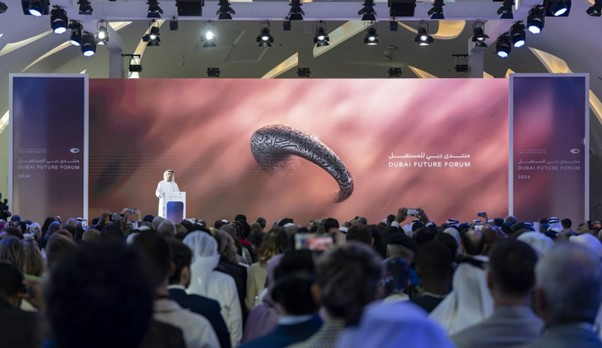The Dubai Future Forum, the world’s largest gathering of futurists, has made bold predictions about the future of humanity, with over 2 million people tuning in from around the world. The event, which brought together leading scientists, technologists, and visionaries from more than 100 countries, discussed how artificial intelligence (AI), biotechnology, and energy innovations will shape the world in the coming years.
One of the most striking forecasts was the potential for AI to take on leadership roles in businesses. Khalfan Belhoul, CEO of the Dubai Future Foundation, suggested that within the next five years, a Fortune 500 company could be led by an AI, not a human. He stressed that this technological supercycle, driven by AI, biotechnology, and advanced sensors, will redefine corporate structures, prompting a major rethink of what it means to lead. “We’ve already seen AI emerge in executive roles,” Belhoul said, indicating that evolution in this area is inevitable.
A key theme at the forum was the convergence of AI and biotechnology, a combination that experts believe will lead to major breakthroughs in medicine, mobility, and climate solutions. Personalised healthcare could become a reality as AI and biotechnology combine to create ‘digital twins’—personalised models of the human body that can be used to develop treatments tailored to specific conditions. In addition, advancements in gene regulation through epigenetics could help individuals manage health risks without altering their DNA.
The forum also explored how AI is set to move beyond its current role as a tool for language processing to a new concept called Large Action Models (LAMs). These systems, experts predict, will be able to anticipate human actions, enabling smarter decision-making and more personalised workflows. LAMs could be used to simulate health scenarios, assist in strategic business decisions, or optimise urban planning, dramatically expanding AI’s role in a variety of industries.
In a world increasingly focused on sustainability, the forum also addressed global energy concerns. Experts forecast that solar energy capacity will double from 220 gigawatts in 2024 to 450 gigawatts in 2025—surpassing the combined energy capacity of Germany and Spain. New energy sources, such as soil-powered renewable energy prototypes developed by Stanford University’s Terracel, were also highlighted as innovative solutions for future power needs.
Climate change was a major topic of discussion, with Laila Abdullatif, Director General of Emirates Nature-WWF, warning that climate-related damage could reach USD 800 billion by 2030. Abdullatif emphasised the importance of nature-based solutions such as coral reefs and mangrove forests, which provide vital flood protection and could help mitigate the impact of climate change.
The Dubai Future Forum, held at the Museum of the Future, attracted more than 150 global speakers and 2,500 experts, and was streamed to millions worldwide. The event marked the beginning of an era where technological advancements will drive change, not just in business but in how humanity interacts with the planet and each other. With the rapid pace of change predicted in the coming years, the forum called for greater investment in innovation, while also ensuring safety and scalability.
The Dubai Future Forum 2024 has set the stage for a revolution in technology, leadership, and sustainability, shaping the blueprint for the future. For more information on the Dubai Future Forum, please visit: dubaifuture.ae/dubai-future-forum-2024



